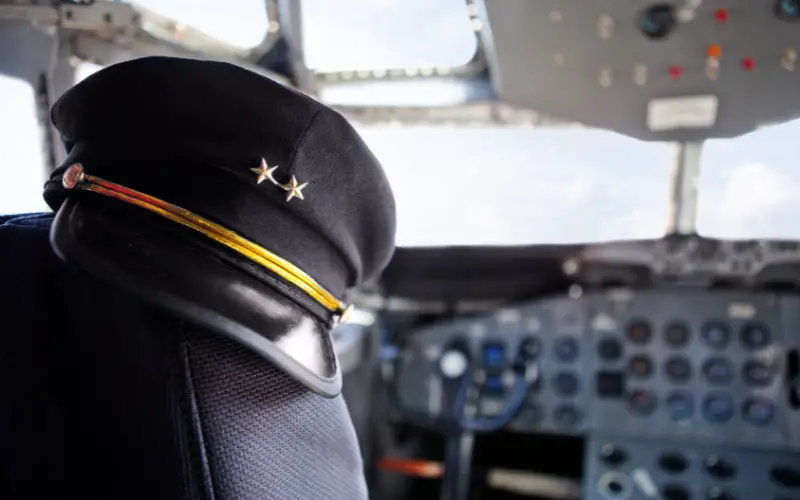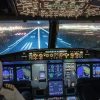Are you a cabin crew member ready for a new challenge?
Wondering if you have what it takes to become a pilot?
This article explores the possibility of making the transition from cabin crew to pilot, examining easily transferable skills and the benefits of being a cabin crew member before becoming a pilot.
If you’re ready to take the next step in your aviation career and want to know everything about making the switch from cabin crew to pilot, fasten your seatbelt and get ready for takeoff!
Sometimes, being a cabin crew first is the key to opening the door to begin a career as a pilot!
💡 Key Takeways
- Transition from cabin crew to pilot is possible but challenging, requiring rigorous tests and training.
- Airlines seldom offer financial aid; assistance mainly comes via internal recruitment.
- Pilot training is costly, typically $70,000 to $90,000.
- Skills needed include physical fitness, English proficiency, and teamwork. Cabin crew experience can help.
- Becoming a pilot takes 3-9 months to obtain a commercial license and up to 2 years for sufficient flight hours.
Table of Contents
Do Airlines Support Flight Attendants to Become Pilots?
The short answer is: no, at least not in the way you might hope for.
While being a cabin crew may give you a taste of what being a pilot is like, it doesn’t mean the airline you work for will give you any financial help or assistance with the recruitment day.
The only way the airline will support a flight attendant becoming a pilot is through internal recruitment.
But keep in mind you still will need to go through the necessary training, accumulate enough flying hours (in the flight deck), etc before applying, which can be hard while you’re still working as a cabin crew.
Also, some airlines are hesitant to let cabin crew transition to pilots because of staff numbers, making internal recruitment potentially more time consuming and thus requiring a good amount of patience.
So what does internal recruitment mean for becoming a pilot?
You will still need to go through all of the mandatory checks again, including fitness tests, hearing tests, eyesight tests, etc.
Internal recruitment serves as an advantage because the company already knows you, has built some trust with you and thus can put in a good reference for you as opposed to someone who has applied from outside the airline.
Please remember that the transition from cabin crew to pilot may be easier mentally, but it isn’t easier in a practical sense, as you will still need to start over fresh and gain all of the necessary skills and training as a pilot.
Unfortunately, financially, the airline you work for is very unlikely to help. The only way the airline will help pay for your pilot training is through paying your wages as a cabin crew.
What is The Cost of Becoming a Pilot?
The cost of becoming a pilot is high.
That is why a lot of people will opt out, or not even attempt to go through the training.
The cost of becoming a pilot depends on the school you go to to get your training, the aircraft you get trained on, location and training system.
But it can be anywhere from USD $70,000 to $90,000 to get a Commercial Pilot License (CPL).
Many people cannot afford to pay this large amount of money, so they get a loan, scholarship or “in-house” financing, which means they get financial support from the training academy.
This can all greatly assist in fulfilling your dream of becoming a pilot, and once you start earning those high wages, it will be fairly easy to pay it back.
What Are The Skills and Requirements to Become a Pilot?
Just like with becoming a flight attendant, there are skills and requirements needed for becoming a licensed pilot.
These include:
- Being at least 18 years old to hold a commercial pilot certificate (though most airlines require a minimum age of 21)
- Having good eyesight and hearing (able to pass the required tests)
- Having a clean criminal history
- Being mentally and physically fit to fly
- Having a good command of the English language (minimum ICAO-Language Proficiency Level 4)
- Possessing strong teamwork, communication, and interpersonal skills
- Demonstrating critical thinking skills to identify and solve problems
- Possessing excellent organizational skills and exceptional attention to detail
Additionally, most airlines require pilots to hold a specific type rating and meet a minimum flight time requirement.
All of these requirements have tests that you will go through in order to determine your suitability.
Will Your Cabin Crew Experience Help?
Cabin crew experience will help, but only for the reason that it will give you insight into the aviation industry.
Through being a cabin crew, you will learn about :
- the aircraft
- shift work
- the different controls in the flight deck (some of these are mandatory for cabin crew to know)
- procedures that the airline has in place.
Being a cabin crew also gives you all of the necessary CRM (Crew Resource Management) training and experience, which is an essential part of being a pilot.
Although the roles between cabin crew and pilots differ in huge ways, they do complement each other on the communication, first aid and security spectrum.
This is why you may find in your own airline that CRM, First Aid training and Security recurrent programs have a combination of cabin crew and pilots in the class.
That being said, you will never know just how much is expected of you until you undertake the pilot training.
Being a pilot comes with many responsibilities that as cabin crew, you won’t even be able to comprehend, but that’s why they are paid so well.
How Long Does It Take To Become a Pilot if You Are a Flight Attendant?
Transitioning from cabin crew to pilot does not guarantee any shortcuts.
Cabin crew becoming pilots still need to go through all of the necessary checks, tests and training in order to be fully certified.
While being a flight attendant helps through experience (such as CRM), it will not give you any more advantage practically than someone who applies from outside the airline.
Yes, the airline may give you an excellent reference, but at best they will open the door for you to get to where you want to be, not give you a fast track to getting your pilot license.
You can expect anywhere from 3 to 9 months to become a commercial pilot and up to 250 flying hours, depending on the training program and individual progress. However, to work for a regional or major airline, you’ll typically need to accumulate 1,500 hours of flight time, which can take 2 years to achieve.
It’s important to note that the path to becoming a pilot requires significant time, effort, and financial investment. Like with being a cabin crew, you need to have a lot of perseverance and patience!
How Hard is it For a Flight Attendant to Become a Pilot?
Transitioning from a flight attendant to a pilot is certainly challenging, but with hard work and determination, it is definitely achievable.
It ultimately depends on the:
- individual’s skills
- the flight school they attend
- their level of commitment to the training process.
I personally know a former flight attendant who successfully pursued her dream of becoming a pilot while still working as a cabin crew member. She chose to enroll in the modular pilot training program, which provided her with the flexibility to continue working while studying. It took her three years to complete the training process, but she persevered through the challenges and was eventually rewarded with a pilot job offer right after completing her training.
This shows that with the right mindset and training program, anyone can successfully transition from cabin crew to pilot.
Conclusion
As you can see, being a flight attendant opens up the door to becoming a pilot, but will not give you any shortcuts.
This is because the airline industry takes pilots extremely seriously, and requires them to do exceptionally well on all of their practical and theory exams before becoming fully qualified with a license.
If anything, being a cabin crew helps to gain an understanding of the airline industry, shift work, aircraft types and features, and CRM, but will never compensate for the intense training that becoming a pilot requires.



